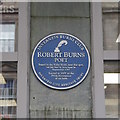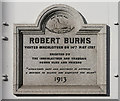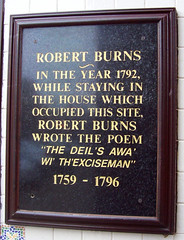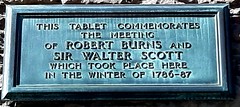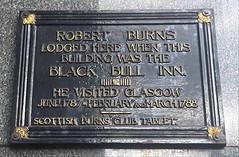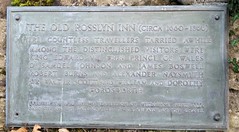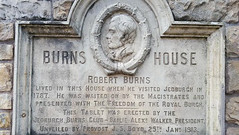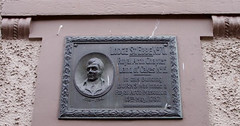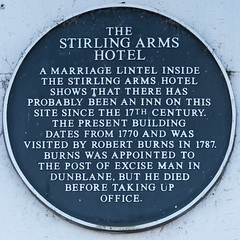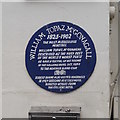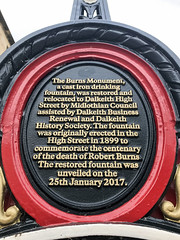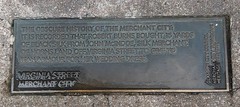Robert Burns
Commemorated on 26 plaques
Robert Burns, poet. Stayed in the Ettles Hotel, near this spot, on his visit to Inverness in September 1787.
Armed Forces Careers Office, Bridge Street, Inverness, United Kingdom where they stayed (1787)
Founded by James Chalmers in January 1748 as the "Aberdeen's Journal" and originally printed and published at an office on the north side of Castle Street, this firm occupied premises in Broad Street from 1894 to 1970. During the 20th century amalgamation took place with the "Aberdeen Free Press" to form Aberdeen Journals Ltd. The company then printed and published its newspapers at rebuilt offices at 20 Broad Street where once lived Dr Alexander Cruden, author of a noted concordance to the bible. Robert Burns the famous Scottish poet visited the Journal offices in 1787. The Press and Journal and Evening Express moved to Lang Stacht in 1970 when this building was opened by Rt Hon Gordon Campbell MCMP Secretary of State for Scotland
Aberdeen Journals Building, Lang Stracht, Aberdeen, United Kingdom where they visited
Robert Burns visited Innerleithen on 14th May 1787
12 High Street, EH44 6HA, Innerleithen, United Kingdom where they visited
Burns House. Robert Burns and his family moved to this house in 1793 from the Wee Vennel, now Bank Street. Here he continued to write songs and here he died on 21st July 1796
Burns House, Burns Street, Dumfries, United Kingdom where they moved to , wrote songs , and died (1796)
Burns' House. In this house the Scottish national poet, Robert Burns, died on 21st July, 1790. After his decease his wife, Jean Armour (Bonnie Jean), continued to reside here until her death in 1834. The mortal remains of the poet and his wife are interred in the kirkyard of St. Michael's situated nearby. In 1851 this house was purchased by the poet's son, Colonel William Nicol Burns EICS and placed by him under the care of trustees for its maintenance as far as possible in perpetuity as a memorial to his father.
Burns House, Burns Street, Dumfries, United Kingdom where they died (1796)
In a house on the east side of this close Robert Burns lived during his first visit to Edinburgh, 1786.
Lady Stair’s Close, Edinburgh, United Kingdom where they lived
To commemorate the visit of Robert Burns to Dumbarton on 29 June, 1787 when he was made an Honorary Burgess and Guild Brother.
Glencairn House, Dumbarton, United Kingdom where they visited
Robert Burns In the year 1792, while staying in the house which occupied this site, Robert Burns wrote the poem "The Deil's Awa' Wi' Th'Exciseman" 1759-1796
Cafe Royal, High Street, Annan, United Kingdom where they stayed (1791) and wrote the poem "The Deil's Awa' Wi' Th'Exciseman" (1791)
In the White Hart Inn Robert Burns stayed during his last visit to Edinburgh 1791
The White Hart Inn, 34 Grassmarket, Edinburgh, United Kingdom where they stayed (1790)
This tablet commemorates the meeting of Robert Burns and Sir Walter Scott which took place here in the winter of 1786 - 87.
Sciennes House Place, Edinburgh, United Kingdom where they was (1785-1786)
Robert Burns lodged here when this building was the Black Bull Inn when he visited Glasgow June 1787, February and March 1788
Virginia Street, G2 8AA, Glasgow, United Kingdom where they lodged (1786-1787)
Eglinton Woods Drukken Steps (St. Bryde's Well) favourite walk (1781-82) of Robert Burns and his sailor friend Richard Brown. "Do you recollect a Sunday we spent together in Eglinton Woods?" R.B. Edinburgh 30th Dec. 1787
Drukken Cairn was near the Drukken Steps / Saint Bryde's Well, relocated in 1976 to McKinnon Terrace, Ayrshire, KA12, Irvine, United Kingdom where they walked (1780-1781)
Robert Burns lodged here 1781 - 1782
4 Glasgow Vennel, Ayrshire, KA12 0BD, Irvine, United Kingdom where they lodged (1780-1781)
Here Burns wrote on a window pane Ask why God made the gem so small, and why so huge the granite, because God meant mankind should set the higher value on it.
Church Gate, Moffat, United Kingdom where they wrote
The Old Rosslyn Inn (circa 1660-1866). Among the distinguished visitors were King Edward VII when Prince of Wales, Dr Samuel Johnson and James Boswell, Robert Burns and Alexander Naysmith, Sir Walter Scott, and William and Dorothy Wordsworth.
Chapel Loan, Roslin, United Kingdom where they visited
Burns House Robert Burns lived in this house when he visited Jedburgh in 1787. He was waited on by the magistrates and presented with the Freedom of the Royal Burgh. Unveiled by the Provost J. S. Boyd 25th Jan 1913.
27 Canongate, TD8 6ER, Jedburgh, United Kingdom where they lived (1787) and visited (1787)
Lodge St. Ebbe No. 70. Royal Arch Chapter Land of Cakes No. 15. In this building Burns was made a Royal Arch Mason on 19th May 1787
Lodge St. Ebbe No. 70, Masons Wynd, TD14 5HG, Eyemouth, United Kingdom where they was (1787)
The Stirling Arms Hotel A marriage lintel inside the Stirling Arms Hotel shows that there has probably been an inn on this site since the 17th century. The present building dates from 1770 and was visited by Robert Burns in 1787. Burns was appointed to the post of Excise man in Dunblane, but he died before taking up office.
Stirling Road, Dunblane, United Kingdom where they was
William Topaz McGonagall 1825-1902 The most miraculous minstrel William Topaz McGonagal Described as the very best of the world's worst poets He gave a recital of his poems in the Gellions Hotel Oct.1894 to the Heather Blend Club Robert Burns also visited Inverness in 1789 residing at Ettles Hotel directly across from the Gellions Hotel
14 Bridge Street, Inverness, United Kingdom where they stayed near (1789)
The Burns Monument, a cast iron drinking fountain, was restored and relocated to Dalkeith High Street by Midlothian Council assisted by Dalkeith Business Renewal and Dalkeith History Society. The fountain was originally erected in the High Street in 1899 to commemorate the centenary of the death of Robert Burns. The restored foutain was unveiled on the 25th January 2017
High Street, Dalkeith, United Kingdom where they was
Robert Burns 1759-1796 bicentenary 1996. In the 1870's this Inn was kept by Mrs. Moore who had been house-keeper at Laight in Glen Afton. The poet visited the Inn en-route between Mauchline and Ellisland.
Castle, New Cumnock, United Kingdom where they visited
The obscure history of the Merchant City. It is recorded that Robert Burns bought 15 yards of black silk from John McIndoe, silk merchant, of Horns Land off Virginia Street to give to Jean Armour for her wedding dress.
Virginia Street, Glasgow, United Kingdom where they shopped
In this building Robert Burns founded his famous literary and debating society The Bachelors' Club. It was handed over to the National Trust of Scotland in 1938
The Bachelors' Club, Sandgate Street, Tarbolton, United Kingdom where they founded
Robert Burns visited Perth 14th-15th Sept 1787 and stayed at Croom's Tavern High Street. Building in close - left-hand side.
188-90 High Street, Perth, United Kingdom where they was

